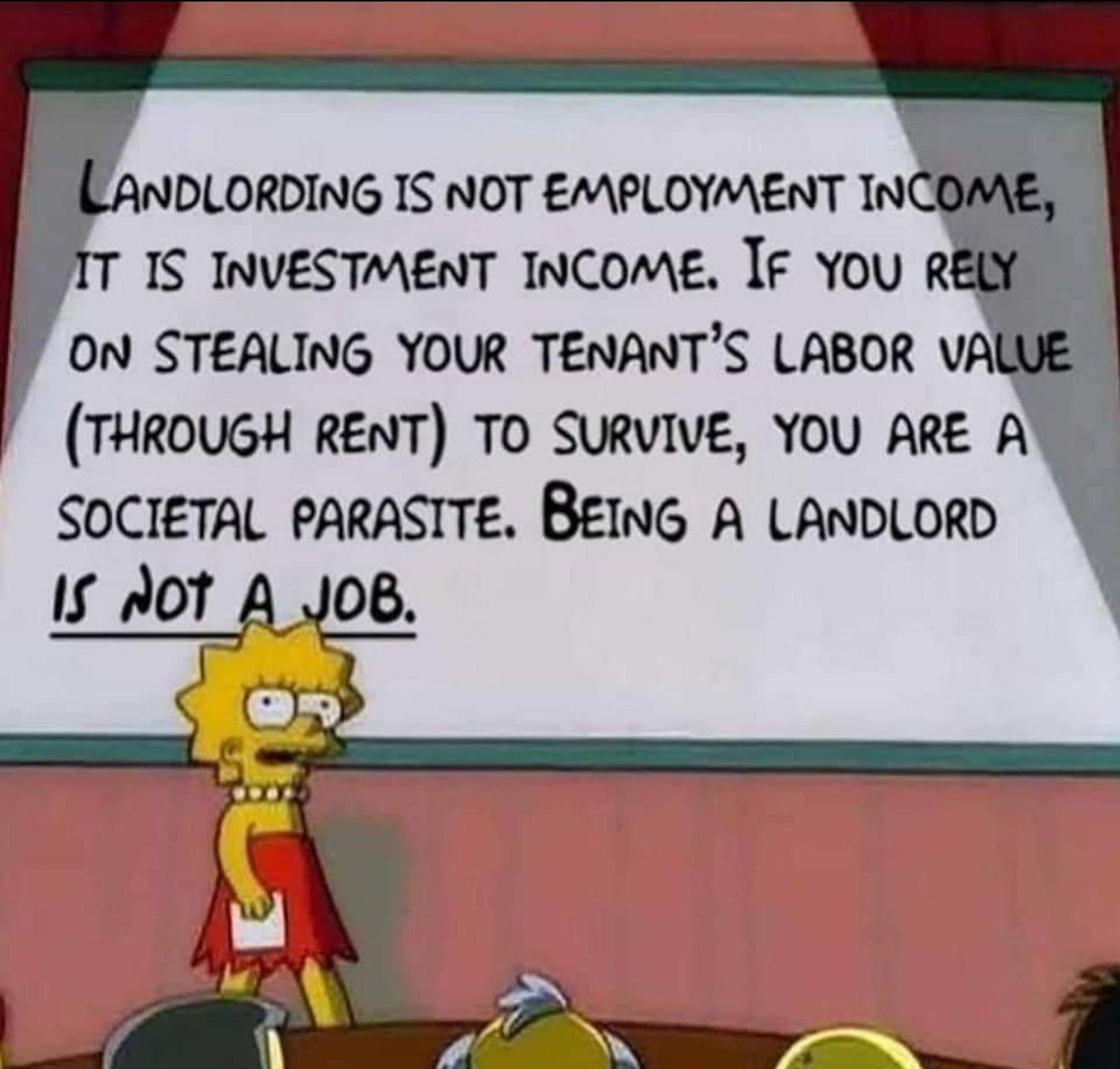this post was submitted on 22 Apr 2024
1011 points (81.1% liked)
A Boring Dystopia
14108 readers
271 users here now
Pictures, Videos, Articles showing just how boring it is to live in a dystopic society, or with signs of a dystopic society.
Rules (Subject to Change)
--Be a Decent Human Being
--Posting news articles: include the source name and exact title from article in your post title
--If a picture is just a screenshot of an article, link the article
--If a video's content isn't clear from title, write a short summary so people know what it's about.
--Posts must have something to do with the topic
--Zero tolerance for Racism/Sexism/Ableism/etc.
--No NSFW content
--Abide by the rules of lemmy.world
founded 2 years ago
MODERATORS
you are viewing a single comment's thread
view the rest of the comments
view the rest of the comments

Rental income is considered income, and taxed assuming reasonable tax brackets much higher than investment income (That is to say, caiptal-gains. Interest/Dividends are also taxed at the higher income rate)
The cost of maintaining a livable home, property taxes, insurance, property depreciation, and renter interactions eat into the supposed windfall that landlords make.
I'm not saying it doesn't suck sometimes and that certainly these formulas are out of whack in some situations, but there are no easy answers.
Depends on how the income is structured. You can own shares in a REIT that manages properties and count the dividends paid out as investment income.
We had interest rates as low as 2.8% APY within the last three years. States have been lowering property taxes steadily for the last decade, as prices skyrocketed. Depreciation doesn't lower the land-value, which is where most of the price inflation has occurred since the first big real estate booms of the 90s. And "renter interactions"? I don't even know what this is attempting to imply. Is cashing the checks costing you money?
Some of the biggest investments hedge funds have made since the COVID crisis have been in residential real estate. This, in a market where The Magnificent Seven stocks have performed 20-30%/year for several years. Someone who works for Warren Buffet clearly sees a windfall in landlord-ism that you're not seeing.
(In the US) divedends are taxed as ordinary income. REITs are required to disburse their profits to the shareholders as divedends.
Only buy-low, sell high appreciation is taxed as capital-gains.
I don’t know where you live but in the US the IRS considers rental income as regular income for tax purposes. So when you fill out your taxes it just goes in your bog standard income section.
Additionally all expenses incurred for certain repairs and maintenance are tax deductible. My house gets similar tax breaks as I work from home, so things like plumbing repair (I guess considered an essential service) and regular maintenance can be deducted (although I’ve never gone over the standard deduction so I never really realize those benefits).
In every imaginable way rental income is better financially than “standard” income…though not morally.
FYI, that's mostly a myth. Taking "home office" deductions has VERY strict rules. Most people working from home don't qualify and what can be deducted is very limited in scope.
You’re not wrong, even including what was available it still wasn’t anywhere near enough to make itemized deduction a reasonable option. I mentioned the plumbing mostly because I thought it was funny that it was actually included in the list of valid deductible expenses for maintaining a home office.
?
If I'm reading the post correctly.
One seems to speak to the way the IRS views or categorizes this income and the other is what the financial realities are for this mode of income.
But, I'm not OP so IDK I'm just going off how interpreted the post.
Sorry I meant in the sense that the income is treated the same plus the benefits of additional deductions. You don’t typically get additional deductions or reimbursements for a normal commute job (for instance gas, maintenance, licensing, etc) that you might see for say…well my wife is a good example as a veterinarian. She’s fully reimbursed for CE, licensing, and other items required for her job.